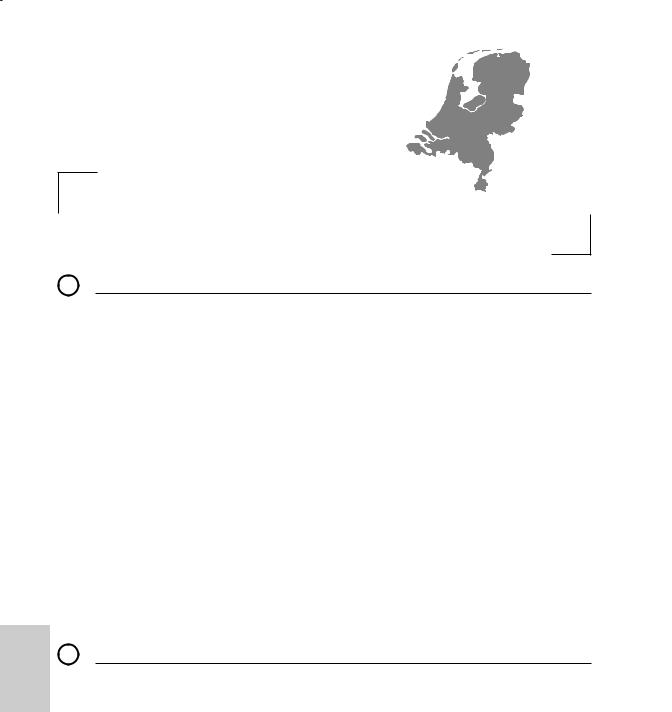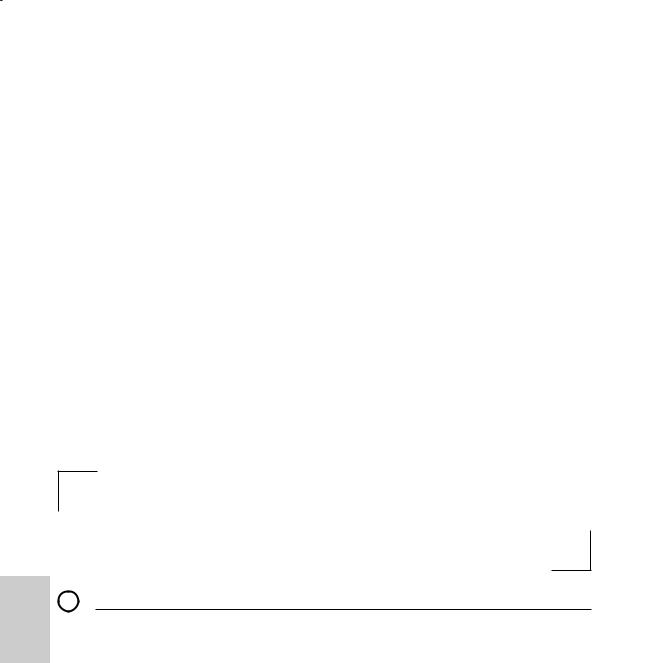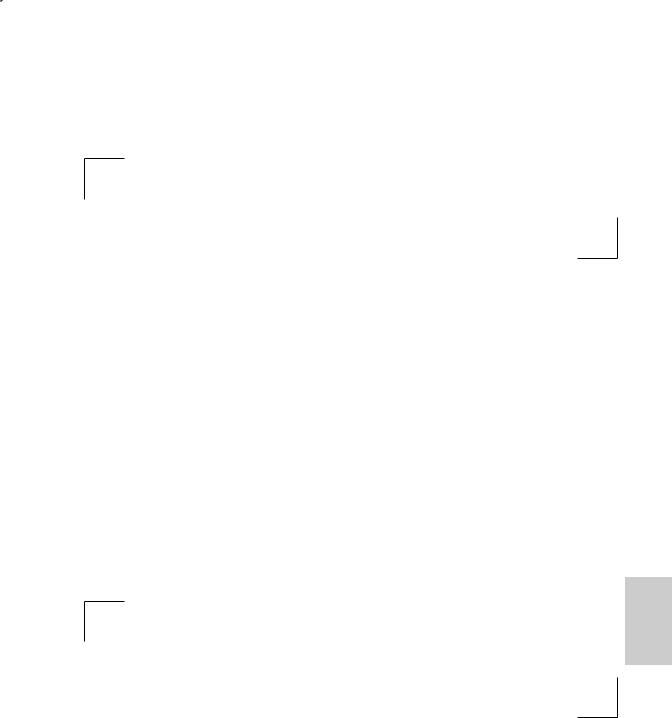
- •Contents
- •Preface
- •Introduction
- •Cultural Orientation
- •Argentina
- •Austria
- •Australia
- •Belarus
- •Belgium
- •Belize
- •Bolivia
- •Brazil
- •Canada
- •Chile
- •China
- •Hong Kong
- •Colombia
- •Costa Rica
- •Czech Republic
- •Denmark
- •Ecuador
- •Egypt
- •Finland
- •France
- •Germany
- •Greece
- •Guatemala
- •Honduras
- •Hungary
- •India
- •Indonesia
- •Ireland
- •Israel
- •Italy
- •Japan
- •Kuwait
- •Malaysia
- •Mexico
- •The Netherlands
- •New Zealand
- •Norway
- •Pakistan
- •Panama
- •Paraguay
- •Peru
- •Philippines
- •Poland
- •Portugal
- •Romania
- •Russia
- •Saudi Arabia
- •Singapore
- •South Africa
- •South Korea
- •Spain
- •Sweden
- •Switzerland
- •Taiwan
- •Thailand
- •Turkey
- •Ukraine
- •United Kingdom
- •United States
- •Uruguay
- •Venezuela
- •Vietnam
- •Index

The Netherlands
Kingdom of the Netherlands
Local short form: Nederland
Local long form: Koninkrijk der Nederlanden
Cultural Note
The Kingdom of the Netherlands is often incorrectly called Holland. Holland refers only to a specific area in the Netherlands, encompassing the major cities of Amsterdam, Rotterdam, and the Hague. It is no more correct to call all of the Netherlands “Holland” than it would be to call all of Germany “Bavaria” or all of Spain “Andalusia.”
The Netherlands
●3 What’s Your Cultural IQ?
1. Match the following notable Dutchmen with their fields of achievement:
a. |
Christiaan Huygens |
1. |
Biology and the Microscope |
b. |
Rembrandt van Rijn |
2. |
Philosophy |
c. |
Baruch (Benedict) de Spinoza |
3. |
Painting |
d. |
Anton van Leeuwenhoek |
4. |
Mathematics and Physics |
ANSWERS: a. 4; b. 3; c. 2; d. 1
2.True or False: It is acceptable to discuss prostitution, soft drugs, and euthanasia with your open-minded Dutch coworkers.
ANSWER: False. Although all are legal in the Netherlands, none are an appropriate topic of conversation in a work environment.
3.True or False? During the 1600s, the Netherlands became a world power, with a globespanning fleet and a far-flung network of colonies.
ANSWER: True. The Dutch fleet even outclassed the British fleet in the early 1600s. Dutch supremacy started to unravel when both Britain and France attacked the Netherlands in 1672.
●3 Tips on Doing Business in the Netherlands
●The Netherlands continues to rank among the top dozen trading nations in the world. Expect Dutch businesspeople to be experienced and sophisticated.
●The Dutch are a low-context, straight-speaking people. They can be blunt spoken and critical without meaning to offend.
●Do not make any promises you cannot keep. The Dutch expect honesty; any backpedaling on what they perceive as a promise will cause you to lose credibility. Even an offhand promise—such as “We’ll take care of it”—is likely to be taken at face value.
322

The Netherlands |
323 |
●3 Country Background
History
Julius Caesar’s troops fought Germanic tribes in what is now the Netherlands. The strongest of these tribes were not subdued until 13 b.c. The Romans were neither the first nor the last to invade the Netherlands.
Following the collapse of the Roman Empire, Charlemagne incorporated the Netherlands into his Kingdom of the Franks.
The Low Countries, as the Netherlands and Belgium were then known, were subsequently claimed by one ruler after another, from the French duke of Burgundy to the Austrian House of Hapsburg. All of these rulers were absentee landlords; they controlled blocks of land in scattered locations throughout Europe. Lacking any political power, the Dutch put their energies into trade and industry.
When Charles I of Spain came of age in a.d. 1516, he inherited title to the Netherlands. But a nation as distant as Spain was bound to have difficulty ruling the increasingly selfsufficient Dutch. The Protestant Reformation increased Dutch opposition; many Dutch became Calvinists and resisted Catholic Spain on religious grounds.
The Dutch revolution spanned eighty years, from 1568 to 1648. Although Spain was then the most powerful nation in Europe, it was unable to subdue the Dutch rebels.
The northern districts of the Low Countries formally united in 1579 under the Union of Utrecht; this is often used as the date of origin of the Netherlands. An equally valid date is 1781, when those northern districts formally declared their independence from Spain. The Spanish agreed to a twelve-year truce with the Dutch in 1609 but did not recognize the Dutch Republic as an independent nation until the Peace of Munster in 1648. The southern Low Countries (Belgium) remained under Spanish control.
The Netherlands survived and prospered. They experimented with several forms of government, with and without kings. The current Kingdom of the Netherlands dates to the ascension of Prince William I as king in 1813.
Beginning in the seventeenth century, the Netherlands enjoyed a “golden era” of economic supremacy as its trade spanned the world. Dutch colonies were founded in Asia and the Caribbean. However, the tiny size and small population of the Netherlands made it inevitable that Dutch economic supremacy would be eclipsed by Britain, France, and Germany.
The Netherlands remained neutral in World War I. However, in World War II, they were invaded and occupied by the Nazis. The Netherlands’ last major colony, Indonesia, was occupied by the Japanese during WWII as well. The Dutch never truly regained control of Indonesia after the war, and Indonesia became independent in 1949. The Dutch still rule the Netherlands Antilles and Aruba in the Caribbean.
The Netherlands

324 |
Kiss, Bow, or Shake Hands |
The Netherlands
In 1995, Dutch confidence in their military was shaken when their peacekeeping troops stationed in Bosnia failed to prevent the Srebrenica massacre. Subsequently, the Dutch were shocked again when the controversial Dutch politician Pym Fortuyn was assassinated in May of 2002.
Type of Government
The Kingdom of the Netherlands is a constitutional monarchy. There is a bicameral Parliament, with a First Chamber and a Second Chamber. The monarch is the chief of state; the prime minister is the head of the government.
The Netherlands is a member of both NATO and the European Community.
Although the Dutch are known for frugality in their personal lives, they have a very generous social welfare system. The government is seeking ways to reduce this system, which is seen as a burden on the economy.
For current government data, check with the Embassy of the Netherlands at www
.netherlands-embassy.org.
Language
The official language of the Netherlands is Dutch. A minor percentage of the population speaks Frisian, Turkish, and Arabic.
The Dutch are among the most accomplished linguists in Europe. A majority of Dutch people speak at least one additional language. English is widely understood.
Ethnologue.com lists sixteen languages spoken in the Netherlands. All are currently in use.
Cultural Note
Frisian is the language of the inhabitants of Friesland province in the northeast Netherlands. The province’s name is also spelled Vriesland. The people have a distinct culture and many native works of literature. There are perhaps 750,000 Frisians, of which some 300,000 live outside Friesland. At various times, the Frisians have demanded independence from the Netherlands. Frisian is considered the language most similar to English. English speakers can sometimes read portions of Frisian text.
The Dutch View
There is no official religion in the Netherlands. Although the Netherlands is thought of as a Protestant nation, Roman Catholics have a slight majority. The Dutch Reformed Church and Calvinists are the significant Protestant denominations. The largest group consists of persons professing no religion at all: nearly 40 percent.
The Dutch live with the knowledge that their tiny country was once, in the seventeenth century, the world’s pre-eminent mercantile power. This is a source of great pride and gives business a great importance even today.
For better or worse, the Dutch also have to live with their legacy as a former colonial power, which involves them in the affairs of places such as Indonesia.

The Netherlands |
325 |
Much of their land is below sea level. Only their elaborate system of dikes protects them from the North Sea.
Equality and tolerance are important aspects of Dutch society. A wide range of behavior is tolerated, as long as it is kept private.
*Know Before You Go
■
The Netherlands is a very safe country, although there is the ever-present worry about the system of dikes that hold back the North Sea. Failure in the dike system would devastate the country and take thousands of lives. This occurred in 1953, when nearly 2,000 people died when storm waters breached the dikes. Then in 1995, serious flooding occurred again, and 250,000 people were evacuated.
Street crime and vehicular accidents are probably the greatest hazards to visitors. The term “vehicular accidents” includes bicycle accidents; the Dutch are avid cyclists. By some reckonings, one-fourth of daily trips made by the Dutch are via bicycle. Bike theft is a problem.
●3 Cultural Orientation
Cognitive Styles: How the Dutch Organize and Process Information
The Dutch are generally circumspect toward outside information. They are abstractive and process information objectively and analytically. There is an obligation to the universal rules of behavior, rather than to the individual. Friendships develop slowly and are very selective.
Negotiation Strategies: What the Dutch Accept as Evidence
Truth lies in the accumulation of objective facts, influenced by a strong faith in a social democratic ideology. Minimal credence is given to subjective feelings. The Dutch tend to offer as little information as possible, and moderation is the rule. Subjective, emotional arguments are not accepted.
Value Systems: The Basis for Behavior
Planning is a way of life in the Netherlands. Planning, regulating, and organizing are of major importance to the Dutch. The following three sections identify the Value Systems in the predominant culture—their methods of dividing right from wrong, good from evil, and so forth.
Locus of Decision-Making
The Dutch are strongly individualistic, but cultural history must be considered in the decision-making process. Individual privacy is considered a necessity in all walks of life.
Decision-making is slow and involved, as all peripheral concerns must be taken care of in the process. Once the decision is made it is unchangeable.
Even though universal values are adhered to, it is important to develop the respect and friendship of the participants.
The Netherlands

326 |
Kiss, Bow, or Shake Hands |
Sources of Anxiety Reduction
Universal rules and regulations combined with strong internal discipline give stability to life and reduce uncertainty.
There is a high need for social and personal order and a low tolerance for deviant behavior. Everything is organized, including leisure time. The Dutch rarely show emotions, because of strong internal structure and control. But the Dutch have great faith in the ability of scientific method to solve human problems.
Some sociologists believe that the Dutch have a high index of uncertainty avoidance. As a result, they generally use laws and morality to give structure to their worldview.
Issues of Equality/Inequality
The Netherlands is a distinctly hierarchical society, with classes established to fill organizational roles and give structure and order. Protest in the Netherlands is a crucial part of the democratic process, because the densely populated and overly structured country breeds dissent.
Equal rights for all are guaranteed by law but may not be practiced in the marketplace. There is some racism (although its presence is often denied).
Although there is still a strong paternal nuclear family orientation (including welldefined roles for males and females), this structure is beginning to erode as more females enter the work force.
The Netherlands
Cultural Note
The Dutch do not usually give compliments to individuals. Everything is considered a team effort, and accolades are awarded to the group, not to individuals. Conversely, individuals are not usually singled out for blame. When something goes wrong, it is considered the fault of a system that failed to exercise proper oversight. The Dutch find self-aggrandizement to be abhorrent.
●3 Business Practices
Punctuality, Appointments, and Local Time
●The residents of the Netherlands, like most Europeans, write the day first, then the month, then the year (e.g., December 3, 2010, is written 3.12.10 or 3/12/10).
●Punctuality is very important in the Netherlands. Be certain to be on time for both business and social engagements.
●The Dutch place great importance on planning and efficient use of time. Arriving even a few minutes late to a business meeting may cause the Dutch to doubt your ability to utilize time well. In the Netherlands, a person who is late is suspected of being either incompetent or untrustworthy—or both!

The Netherlands |
327 |
●Another important aspect of punctuality in the Netherlands involves response time. Any company that cannot promptly deliver price quotes upon request will fail to win Dutch customers. It is also important to deliver products and services quickly.
●A very high percentage of Dutch businesspeople are fluent in English. In almost every situation, someone who can translate from English to Dutch will be close at hand.
●Appointments will be carefully scheduled; do not assume that they can be changed on short notice. Spontaneity is not considered a virtue in the Netherlands.
●Give as much notice as possible for an appointment made by telephone or e-mail.
●Always acknowledge the receipt of important communications immediately (contracts, price quotes, letters of intent, and so forth).
●Business letters may be written in English. Keep your letters formal, businesslike, and grammatically correct. When addressing individuals in writing, be sure to use their full and correct title, even if you are on a first-name basis.
●Many Dutch executives take long vacations during June, July, August, and late December, so confirm that your counterpart will be available.
●The Netherlands is one hour ahead of Greenwich Mean Time (G.M.T. +1), or six hours ahead of U.S. Eastern Standard Time (E.S.T. +6).
Cultural Note
Avoid conveying information that you want kept confidential. The Dutch prefer to keep their operations open to suggestions from all employees in a company, so all personnel are given access to information. Furthermore, the Dutch are generally uncomfortable with secrets.
Negotiating
● |
Do not be surprised if meetings begin with little or no preliminary socializing. The Dutch |
|
|
|
value the effective use of time and do not like to waste it on small talk. |
|
|
|
Netherlands |
||
● |
Dutch executives are often straightforward and efficient. However, the pace of corporate |
||
|
|||
|
decision-making may be slower in the Netherlands than in North America. |
|
|
● |
Decisions in Dutch firms are based upon consensus. Every employee who may be affected |
The |
|
|
will be consulted. All opinions will be listened to, regardless of the status or seniority of |
||
|
|
||
|
|
||
|
the person. The process can take a good deal of time. |
|
|
● |
Dutch society values diversity of opinion. Everyone has his or her say, and they do not |
|
|
|
have to agree. An effort will be made to accommodate all divergent positions. This will |
|
|
|
include an attempt to make dissenters change their minds. |
|
|
● |
Once a positive decision has been reached, Dutch firms will move swiftly. Everyone will |
|
|
|
be committed to the project and will be prepared to act quickly. |
|
|
● |
A negative decision may be slower in coming. The one area in which many Dutch are not |
|
|
|
blunt is in saying “no.” They may prevaricate or predict insurmountable complications |
|
|
|
instead of giving a direct “no.” |
|

328 Kiss, Bow, or Shake Hands
|
● |
The Dutch admire modesty and abhor exaggeration or ostentation. Be sure you can back |
|
|
|
up your claims with lots of data. Keep your presentation clear and straightforward. |
|
|
● |
Keep every promise you make, no matter how minor. A person who cannot be trusted to |
|
|
|
be punctual or to deliver a proposal on time will not be considered responsible enough |
|
|
|
to fulfill a contract. |
|
|
● |
Most executives in the Netherlands understand English, so it is not necessary to have |
|
|
|
your business cards translated. However, all promotional materials and instruction |
|
|
|
manuals should be translated into Dutch. |
|
|
● |
History is very important in the Netherlands. If your company has been around for many |
|
|
|
years, the date of its founding should be on your business card. |
|
|
● |
Education is well respected in the Netherlands; include any degree above the bachelor’s |
|
|
|
level on your card. |
|
|
● |
It is quite possible that you will walk into an office and start talking business immediately |
|
|
|
after introducing yourself. In a country with centuries of experience in commerce, Dutch |
|
|
|
executives believe that they can judge whether they wish to work with someone quickly. |
|
|
● |
In addition, it is also possible that a Dutch executive will have had background research |
|
|
|
done on prospective clients. This gives the executives hard data to back up their impres- |
|
|
|
sions, while maintaining a reputation for being “canny judges of human character.” |
|
|
● |
When the Dutch decide to chat before getting down to business, expect to be asked about |
|
|
|
your flight, your accommodations, where you are from, and so forth. Contacts are vital |
|
|
|
to doing business in the Netherlands, so know the name of every possible person who |
|
|
|
could give you or your company a good reference. Be aware of recent political events, |
|
|
|
both in your own country and in the Netherlands; the Dutch frequently discuss politics. |
|
|
● |
The Dutch respect honesty and forthrightness. It is better to be blunt than to appear |
|
|
|
devious or evasive. |
|
|
● |
When an individual must be either complimented or chastised, the Dutch always do so |
|
|
|
in private. |
|
Netherlands |
|
||
● |
Always avoid giving an impression of superiority. Egalitarianism is a central tenet of |
||
|
|||
|
|
Dutch society. Everyone in a Dutch company, from the boss to every laborer, is consid- |
|
The |
|
ered valuable and worthy of respect. |
|
● |
Privacy is very important in the Netherlands. Doors are kept closed, both at work and at |
||
|
|||
|
|
home. Always knock on a closed door and wait to be admitted. |
|
|
● |
Keep personal questions superficial; if your counterpart wants you to know any detail |
|
|
|
about his or her family, he or she will tell you. Avoid talking about sex, including the fact |
|
|
|
that prostitution is legal in the Netherlands. |
|
|
● |
The Dutch tend to stand somewhat further apart than North Americans when talking. |
|
|
|
The positioning of furniture reflects this, and you may find yourself giving a sales pitch |
|
|
|
from a chair that seems uncomfortably far away. Do not move your chair closer; it is not |
|
|
|
your place to rearrange the furniture. |

The Netherlands |
329 |
●Dutch family life is kept separate from business dealings. However, executives do take work home with them and may be phoned at home about business matters.
Cultural Note
Although business is considered a serious matter, the Dutch occasionally enjoy humor in formal business presentations and official speeches. The Dutch sense of humor tends to be good-natured and earthy; wit, sarcasm, and verbal legerdemain are not prized.
Business Entertaining
●Although the Netherlands is not known for its cuisine, food constitutes an important part of Dutch entertainment.
●In addition to three meals a day, the Dutch often break for a snack at 10:00 a.m. and 4:00 p.m. Coffee is available at the morning break; the afternoon drink is usually tea.
●The Dutch enjoy hosting foreign businesspeople at lunches and dinners. These are usually held in restaurants rather than in Dutch homes.
●All social events will be carefully scheduled and planned. The Dutch do not appreciate spontaneity, and they do not “do lunch” on a moment’s notice.
●Remember to be on time to social events.
●Fine coffee is prized in the Netherlands; expect to drink a lot of it.
●When eating, always use utensils; very few items are eaten with the hands. Many Dutch even eat bread with a knife and fork!
●At the dinner table, do not rest your hands in your lap. Keep both hands above the table, with your wrists resting on the tabletop.
Cultural Note
As an alternative to a formal dinner, the Dutch often invite guests to come to their home after dinner. The guests are offered numerous hors d’oeuvres, plus alcohol and coffee. The amount of food and drink at these events can rival a full meal, but the setting is more relaxed and informal.
●3 Protocol
Greetings
●Virtually everyone shakes hands in the Netherlands, both upon greeting and upon departure. Men shake hands, firmly but briefly, with other men, with most women, and even when being introduced to a child.
●Upon introduction, repeat your last name while you are shaking hands. It is not traditional to utter any greeting phrase (such as “How do you do?”), although many Dutch businesspeople will do so to make a foreigner feel at ease.
The Netherlands

330 |
Kiss, Bow, or Shake Hands |
The Netherlands
When you have not been formally introduced to everyone at a business or social gathering, it is your job to introduce yourself. Failure to do so may leave a bad first impression.
●Avoid standing with your hands in your pockets, and never leave your left hand in your pocket while shaking hands with your right.
●Aside from handshakes, there is very little public contact in the Netherlands. Close friends or relatives may hug briefly.
Titles/Forms of Address
●The order of names among the Dutch is first name followed by surname.
●As a foreigner, it may take you a long time to establish a close enough relationship with a Dutch colleague to get to a first-name basis. However, Dutch associates will usually use their first names amongst themselves at work.
●On the other hand, many Dutch executives are experts at dealing with foreign businesspeople. Your Dutch counterpart may quickly suggest going to a first-name basis. Understand that he or she is trying to make you feel comfortable.
●Dutch surnames can be confusing to foreigners, especially when they are preceded by a prefix. Common Dutch prefixes include: de, der, den, and het (which all mean “the”); op means “on,” and van, van’t, van den, and van der all mean “from.”
●There is usually a space between prefixes and the surname in the north of the Netherlands. In the south, the prefixes may be combined and attached to the surname. For example, the form “van der Heyde” is common in the north, while “vanderHeyde”—all one word—is common in the south.
●Professional titles are not always used when speaking. Usually, an attorney, engineer, or doctor who wishes you to use a title will introduce himself or herself to you that way.
●Written communication in the Netherlands is very formal. Know the recipient’s correct professional title and be sure to use it in the letter or e-mail.
●When entering a shop, it is considered polite to say “good day” to everyone present, customers and employees alike. However, do not interrupt—Dutch clerks will wait on only one person at a time.
Gifts
●Any gift to a Dutch executive should be of good quality but not of exorbitant cost.
●Appropriate gifts to businesspeople include imported liquor, good-quality pens, pocket calculators, or any new gadget. Wine collecting is common, so do not give a gift of wine unless you can make an appropriate selection for that person.
●If you are invited to dinner at a Dutch home, bring a bouquet of unwrapped flowers for your host; or, you may send a bouquet or a plant the following day.
●Avoid bringing wine as a gift to dinner; you don’t want to imply that your host’s wine cellar is inadequate.

The Netherlands |
331 |
●Chocolate or candy is also a good gift when you are invited to a Dutch home, especially if there are children in the house.
Cultural Note
The Netherlands is not the place to“dress for success.” The wealthier and more successful a Dutch executive has become, the harder he or she must work at appearing ordinary. Wealthy Dutch citizens often may not wear fancy clothes, drive exotic cars, or live in expensive mansions. In a crowd, a Dutch CEO might not be distinguishable from a low-ranking executive.
Dress
●Business dress in the Netherlands is fairly conservative, but it varies with the industry. In the financial industries, most businessmen wear dark suits, sedate ties, and white shirts; women dress in dark suits and white blouses. Expect to wear the same clothes when invited to dinner.
●However, some industries allow very informal dress. Quite a few executives save their ties and jackets for outside the office.
●Surprisingly, the higher a person’s rank, the more informally he or she can dress (in some industries). You may find the sales clerks in suits and the boss in jeans and a sweater.
●As in many countries, Dutch men remove their jackets when working. Follow their lead.
●When the occasion calls for it, the Dutch enjoy dressing up. A tuxedo for men and an evening gown for women may be required for formal social events. These include formal parties, dinners, and opening night at the theater.
●Casualwear is essentially the same as in North America. However, shorts are worn only when jogging or hiking.
Cultural Note
In March of 2004, the Netherlands’ Queen Mother Juliana passed away. She was an extraordinary example of a royal personage with a streak of populism. She cast aside many of the formal protocols of sovereignty—and was comfortable riding a bike, buying bread in local markets, pouring her own tea, and helping those in need. The Queen Mother was particularly loved for the selfless work she did when the dykes burst in 1953. Donning Wellingtons, she slogged through her flooded country, taking food and supplies to the displaced. Her rule spanned thirty-two years.
The Netherlands
